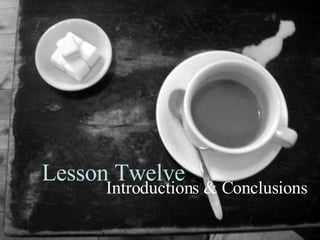
Lesson 12: Introductions And Conclusions
- 1. Lesson Twelve Introductions & Conclusions
- 2. You must be in class because we will be doing a peer review in class. If you are not in class, you must come to my office hours the following week. Ne x t Week
- 3. Short Reflection Preparation for Final Exam Week 18 Final Portfolio Argument in Life Week 17 Editing Week 16 Second Draft / Formal Outline / Reading notes Peer Review Week 15 Introductions / Conclusions Week 14 Avoiding Plagiarism Week 13 First Draft / Outline Example Text/ Introductions Week 12 Example Text Week 11
- 5. Reading N o tes How to remember the information Discuss pg 252 – 255 in text Of course, there are many different ways to take notes. Do whatever works best for you.
- 6. 1,700 – 2,000 words You must include an introduction and a conclusion . Also, you must include in-text notes and a works cited page. Sec o nd Draft
- 7. At the beginning of your outline, please write your thesis statement. At the end of you essay, write the following sentence and sign your name: “ I promise that I have not plagiarized on this essay. I know that if I am caught plagiarizing, I will receive a zero as my grade.” Sec o nd Draft
- 9. Structure of Analytical Thesis Statements This pattern can serve as an aid: Independent clause(s) + restricting clause(s) [general ideas are stated] [qualifying idea(s) defined] Thesis Stat e ments
- 10. Nowadays, women are no longer looked down upon by society, for they are playing an important part in many fields which cause society to advance. Th e sis Statement Independent Clause Dependent Clause Relationship Word
- 11. This paper tells us Chinese traditional culture. It is divided into several aspects: the first aspect is lead-in, it is not the most important one but give us a general beginning; the second aspect shows excellent points of Chinese traditional culture; the third aspect shows some negative points; the last aspect is a conclusion but not a simple conclusion. The whole paper shows us the author's idea on Chinese traditional culture and how to judge the culture. The author uses relative method. Th e sis Statement
- 12. In this article we will discuss the situation of graduates' employment in China by analyzing the reasons and measures of their unemployment. What is the writer’s claim? Th e sis Statement
- 13. Sex education is necessary for the teenagers because the growing incidence of teenage pregnancies and the rise in HIV. Th e sis Statement
- 14. Talk about the generation gap between the parent and the child. How it comes out and how to narrow the generation gap. What is the writers claim? Th e sis Statement
- 15. I: Give the situation of the relationship between the parent and the child in China II: Why does the generation gap exist? III: How to narrow the generation gap? How can we expand this outline? O utline
- 16. The problems existing in the development of the left-behind children are mainly caused by parental absence because parents play the most important role in children's development. Th e sis Statement
- 17. I. Introduction of parental absence in the countryside of China II. Lack of supervision caused by parental absence A. Grandparents' supervision B. Relatives' supervision III. Children's problems caused by lack of supervision A. In education B. In behavior O utline
- 18. I. Introduction of parental absence in the countryside of China II. Lack of supervision caused by parental absence A. Grandparents' supervision B. Relatives' supervision III. Children's problems caused by lack of supervision A. In education B. In behavior O utline
- 19. IV. Parents' role playing in the children's development A. Getting an example B. Supporting in feeling C. Mother and father's function V. Conclusion O utline
- 20. Introduct o ry Paragraphs
- 34. You can use any of these methods of development in different combinations. You don’t have to use only one. Rem e mber:
- 57. You can use any of these methods of development in different combinations. You don’t have to use only one. Rem e mber:
- 70. You must be in class because we will be doing an in-class peer review. If you are not in class, you must come to my office hours the following week. Ne x t Week
